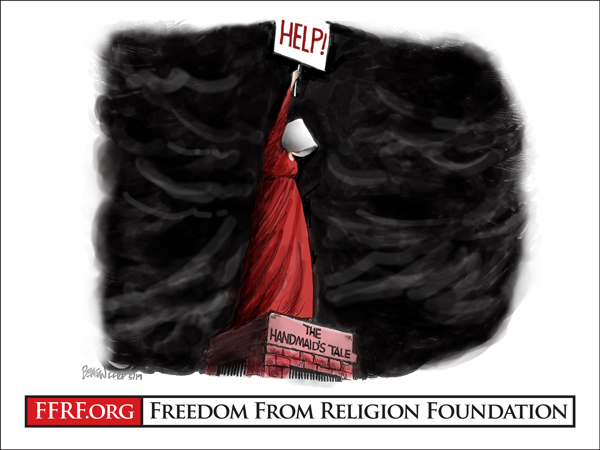
The Freedom From Religion Foundation castigates the Texas Legislature for approving a bill to ban abortion care as early as six weeks of gestation. The bill will assuredly be signed into law by Gov. Greg Abbott, a Christian nationalist whom FFRF recently successfully prevailed over his bigoted censorship of FFRF’s freethought view at the Texas Capitol.
This follows alarming passage of sweeping anti-abortion legislation in April severely restricting abortion care and signed into law in Montana, Arizona, South Dakota, Wyoming, Oklahoma and Idaho. More than 500 abortion restrictions have already been introduced at the state level so far this year.
Texas is following the actions of nearly a dozen other states that have passed the so-called “heartbeat” bill — a medically inaccurate misnomer. Dr. Ted Anderson, president of the American College of Obstetricians and Gynecologists, an organization that represents 58,000 physicians in the United States, explains that this labeling is incongruent with the “anatomical and clinical realities of that stage of pregnancy” because the so-called heartbeat is simply “electrically induced flickering of a portion of the fetal tissue.”
It has long been established and upheld by the Supreme Court that it is unconstitutional to impose a previability abortion ban. Pregnancies are considered viable around 24-26 weeks of gestation. Even then, the court agrees with medical experts that each pregnancy is unique. Therefore this anti-abortion bill is Texas is completely unconstitutional.
Shockingly, the bill also allows anyone to sue a doctor for providing abortion care or anyone else who helped someone get an abortion. This includes abortion funds that provide financial assistance, clinic employees — and even friends and family who drive a loved one to an abortion appointment. Perhaps the most startling aspect of this bill is that the person filing the lawsuit would not need any personal connection to the abortion, at odds with all legal precedent. Anti-abortion protestors, out-of-state lobbying groups, and religious organizations under the law could overwhelm doctors and clinics with lawsuits and displace resources from women seeking care.
In our secular nation, laws related to health care should reflect science — not the religious or other motivations of legislators.
Such laws endanger the rights of women nationwide, as they are intended to land before the U.S. Supreme Court, on which a majority, since the replacement of Justice Ruth Bader Ginsburg with Amy Coney Barrett, is anti-abortion. A “chill wind blows,” as the late Justice Harry Blackmun warned against the first erosions back in the 1980s of Roe v. Wade.
